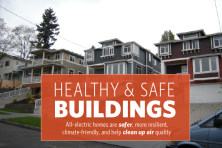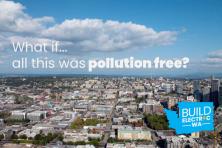We’re just over a week out from the “heat dome” that shattered records across the Pacific Northwest. Last week saw the highest ever recorded temperatures for cities across the region: Portland, Salem, Olympia, Seattle, Bellingham, and more. Not only is our region unaccustomed to this type of what used to be a “once in a millennium” heat event – we’re also woefully unprotected from its impacts. Seattle holds the dubious honor of being the least air-conditioned metro area in the country, with only 44% of households having some type of cooling infrastructure.
This leads to dire health impacts. While we tend to think of heat waves being most dangerous when people are out in the sun, heat illnesses and deaths mostly occur inside buildings, particularly threatening those who are bedridden or have preexisting medical conditions. Lack of air conditioning, living alone, and not leaving the house frequently are also strongly correlated social risk factors for heat deaths. Last week’s heat wave yielded tragic results: at least 1,300 people in Washington were admitted to emergency rooms from heat-related illness, while Oregon saw at least 94 deaths attributed to the punishing heat.
If we keep burning fossil fuels for our energy, we’re only going to see more unprecedented heat waves in the Pacific Northwest. We need to be working both to reduce our greenhouse gas emissions and to protect our communities from these kinds of climate change impacts. That’s where the movement towards clean, safe, all-electric buildings comes in.
All-electric homes often use electric heat pump technology – the term is a bit of a misnomer, since electric heat pumps provide both heating and cooling in one system. Instead of generating heat (and air conditioning) through fossil fuel combustion, electric heat pumps work by extracting heat from the outdoor air or from the ground, concentrating it, and delivering it inside. To cool, they work in the opposite direction: pulling hot air from inside and replacing it with cooler air.
Because Washington and Oregon have both committed to a 100% clean electric grid in the coming decades, electric heat pumps can be an incredible solution to our heating and cooling needs. Heat pumps are also highly energy efficient and can reduce energy use for heating and cooling by more than 50%, especially when replacing outdated window air conditioning units. Unlike gas heating systems, they use existing heat rather than creating their own, making heat pumps around 300% efficient.
That can mean lower energy bills for customers over time. And because state law in Washington requires electric utilities to offer financial assistance to low-income customers, shifting from gas to efficient heat pumps can especially benefit low-income, Black, Latinx, and Indigenous communities who carry disproportionately high household energy burdens. There are no similar requirements in Washington for gas utilities to provide financial assistance.
By using heat pumps to reduce our energy use, we can reduce strain on the electric grid to protect us from potential power outages while we stay safe and cool. Also, while the fossil fuel industry wants you to think that gas is more reliable, the truth is that most modern gas appliances also require electricity to work – for example, furnaces need electricity to power their burner fans. By phasing out gas in homes and buildings and outfitting them with efficient heat pumps, states can invest more financial resources into maintaining and expanding the electricity grid, rather than pouring billions of dollars into maintaining polluting, dangerous gas pipelines.
All-electric buildings are a win-win, both reducing our greenhouse gas emissions and protecting our health and safety through providing affordable air conditioning. Heat waves will be a more frequent part of our future in the Pacific Northwest, but we don’t have to just sit back and face that harm – we can act to mitigate climate change and protect our frontline communities and ourselves by passing policies to require clean, safe, all-electric buildings.
You can take action!
Sign up for Climate Solutions' Super Advocate Team for more opportunities to help – we’ll do our best to engage you on local specific work, and state and federal opportunities
Write a Letter to the Editor and submit to your local paper and to your council members (even if not published) – if you choose, you can use these talking points, or contact us for more support
Call your local elected officials to let them know that you want clean, safe, all-electric buildings in your city or county
Actions specific to Washington residents:
If you live in one of these areas, sign the relevant petition below to let your elected officials know that you support all-electric buildings:
If you live or work in unincorporated King County specifically, you can volunteer here to give public comment later this summer on a policy to require new commercial and large multifamily buildings to use heat pumps.
Help educate your friends and family with our four-pager here.





